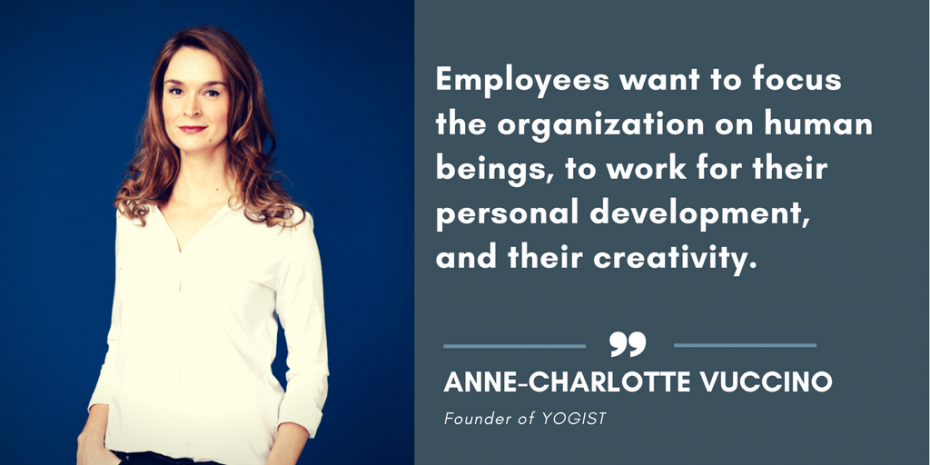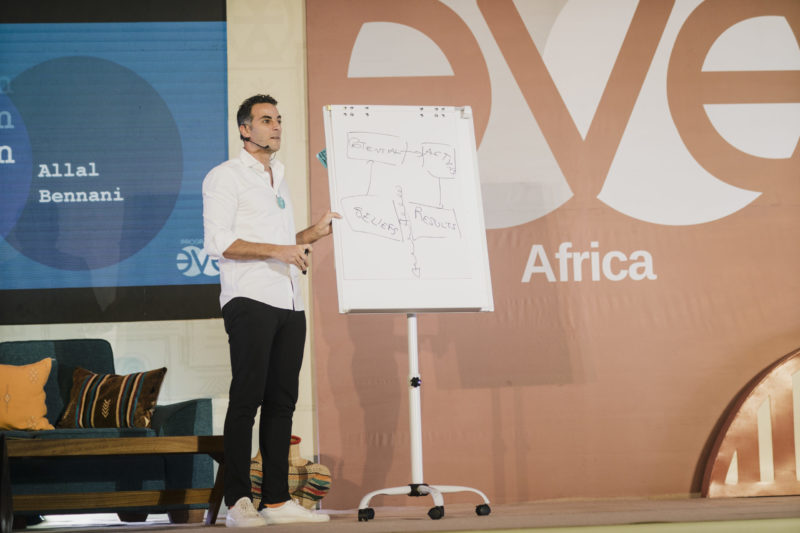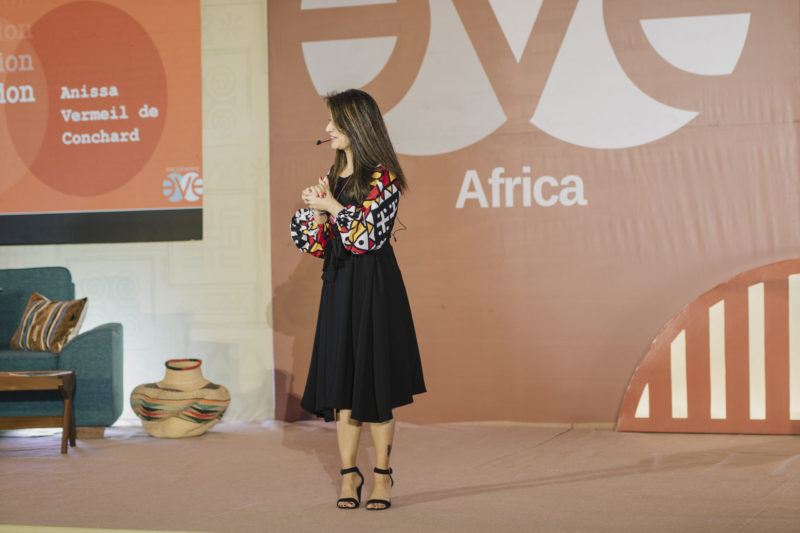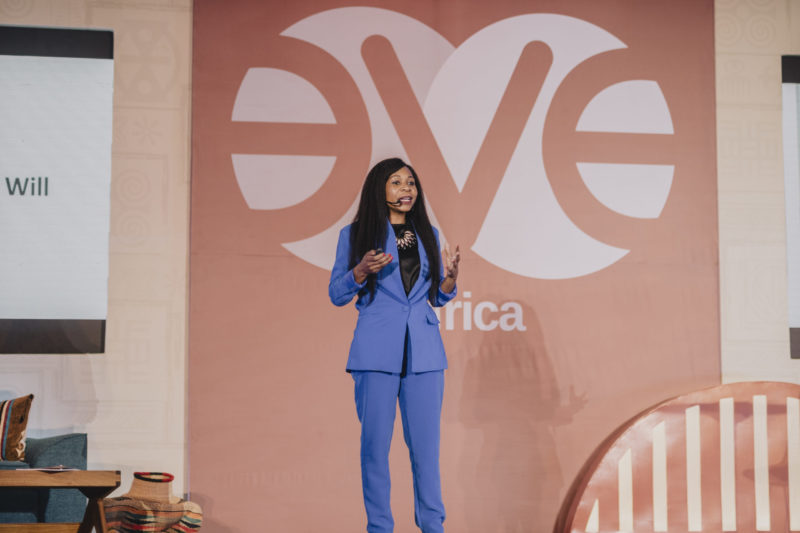 Anne-Charlotte is speaker at the EVE Program 2017. She leads a workshop about Yoga Corporate, a method to release and prevent stress and tensions in your professional life. We wanted to know more about her career and the benefits of this practice.
Anne-Charlotte is speaker at the EVE Program 2017. She leads a workshop about Yoga Corporate, a method to release and prevent stress and tensions in your professional life. We wanted to know more about her career and the benefits of this practice.
1/ How did you transition from Account Executive to Yoga Teacher?
Well put like that it does sound like quite the transformation! But the switch actually fit perfectly with both my professional experience and my personal history. Let me explain how it happened. I first discovered yoga ten years ago when I was a first-year student at the HEC business school and was heading up a humanitarian mission in Africa. I was knocked down by a policeman on a motorbike and left severely handicapped. I became a strategy consultant, but discovered yoga during my rehabilitation, and I even recovered the use of my leg through this ancestral practice. In 2015, I left my career and set off for India to get trained in therapeutic yoga. I was certain that yoga had changed my life, so I developed a new method to share its benefits with those who need it most: businesses and their employees! So I created YOGIST-Well at Work (www.yogist.co), the first “corporate yoga start-up” to combat stress within companies and relieve pain related to screen work.
When I was a strategy consultant, my job was to find solutions to complex problems, often involving complicated theories and formulations. I worked with managers and company executives and I began to give them tips from my experience with yoga on how to be more focused, how to have more impact while speaking in public, or how to eliminate back pain or insomnia. My clients were actually more grateful to me for those pointers than for my consulting notes! Today, I take the same approach as a consultant, and tailor the yoga I teach to the corporate world and HR issues, change management, preventive healthcare and performance improvement. Only the solution has changed: less PowerPoint, more techniques involving the body, breathing, and overall control. My goal is to make corporate yoga a tool for preventive healthcare and management in companies.
2/ How do you explain the acute need to restore balance that is being expressed today by company employees?
Ten years after the wave of suicides that had an emotional impact on the whole of France, quality of life at work – the human pillar for sustainable development – is now (at long last) drawing the attention of companies and employees, and even the media. In these times of automation and digitization, the liberty of a freelancer is the stuff of dreams. The image of an entrepreneur has replaced that of an artist in the collective subconscious, and Generation Z no longer takes pride in pulling all-nighters at the office. Young graduates are fleeing corporate centers like la Défense and Wall Street, and, despite the economic downturn, some have no qualms about leaving their job before they find the next one, to “work for themselves”. “Employee experience”, the “employer brand”, and the attractiveness of companies on a human level are the new watchwords. Actions that will really forge bonds, protect employees’ mental and physical health and, perhaps, bring the thrill back to working, are now the focus of every concern. Because anyone can experience anxiety at work. From receptionists to executives, we all spend most of our days sitting, – and not properly – squinting at our screens or dashing from meeting to meeting. We all experience back pain, insomnia, tendonitis from using a mouse, and eye strain caused by screens and air conditioning. When you realize that low back pain (the final stage of back pain that is caused by physical inactivity and stress) costs society an average of 44,000 euros and triggers the loss of more than 8 million working days, and when you realize that 80% of the French population suffer or will one day suffer from back pain, it certainly provides food for thought… Without going as far as that, have you ever managed to work efficiently and stay focused during a meeting with either a crick in the neck, a migraine, or low back pain? And what about “presenteeism”? That’s when employees are at work but experience a sharp drop in productivity because they are sick, exhausted, in a state of psychological anxiety or completely demotivated; this new phenomenon is on the rise: it is believed to be responsible for the loss of between 14 and 24 billion euros (twice as much as absenteeism) for companies.
And that’s where the importance of quality of life at work, personal development and self-fulfillment becomes clear; when they impact the body and health. Employees are searching for meaning in their job. They no longer want to sacrifice their personal lives and health for a job they do not like (or no longer enjoy). They want to focus the organization of their company on human beings, to work for their personal development, their creativity and the smooth functioning of their teams. And such emphasis on personal enrichment for employees can only ultimately have positive repercussions on productivity, individual and collective performance, and the company’s ability to innovate. As a result, the company improves its attractiveness and its ability to retain talent, and in doing so, boosts its competitiveness. It’s a “win-win”!
3/ What do you think the leadership of the future looks like?
Executives and managers often feel that they are “carrying the world on their shoulders”, that they have to push their employees forward, and women are accumulating the burden of family life as well as their careers. I believe that this need to restore balance, to take care of yourself, derives simply from the fact that the current conception of management and leadership is no longer tenable. In our society, managers are too often the ones who centralize, gives order, verify, encourage or admonish. In my opinion, the leadership of the future will be based on our ability to recognize in the personality of employees the wealth of features that are not strictly “corporate”. Looking at their talents, and seeing their curiosity and the skills that don’t have a direct link to the core business of the company, as assets. Bringing hybrid or unconventional profiles into the limelight. Thinking outside the box, outside career paths and CVs, and recruiting “the right person”, not the best candidate. Gradually moving away from the fixed chain of management and aiming for an autonomy that opens the path to efficiency and creativity. Elon Musk recently leaked an internal email to Tesla employees chastising the “stupid” way we communicate within companies, a way that is based on hierarchy and silos. He encourages everyone to communicate directly with the person whom they think is most likely to solve the problem they are facing, as long as they are sure that it is in the company’s best interests. The idea that we are all in the same boat, instead of considering others as rivals whose access to strategic information must be limited, seems to me at once very simple, even obvious, and yet incredibly forward-thinking and promising for the future.






